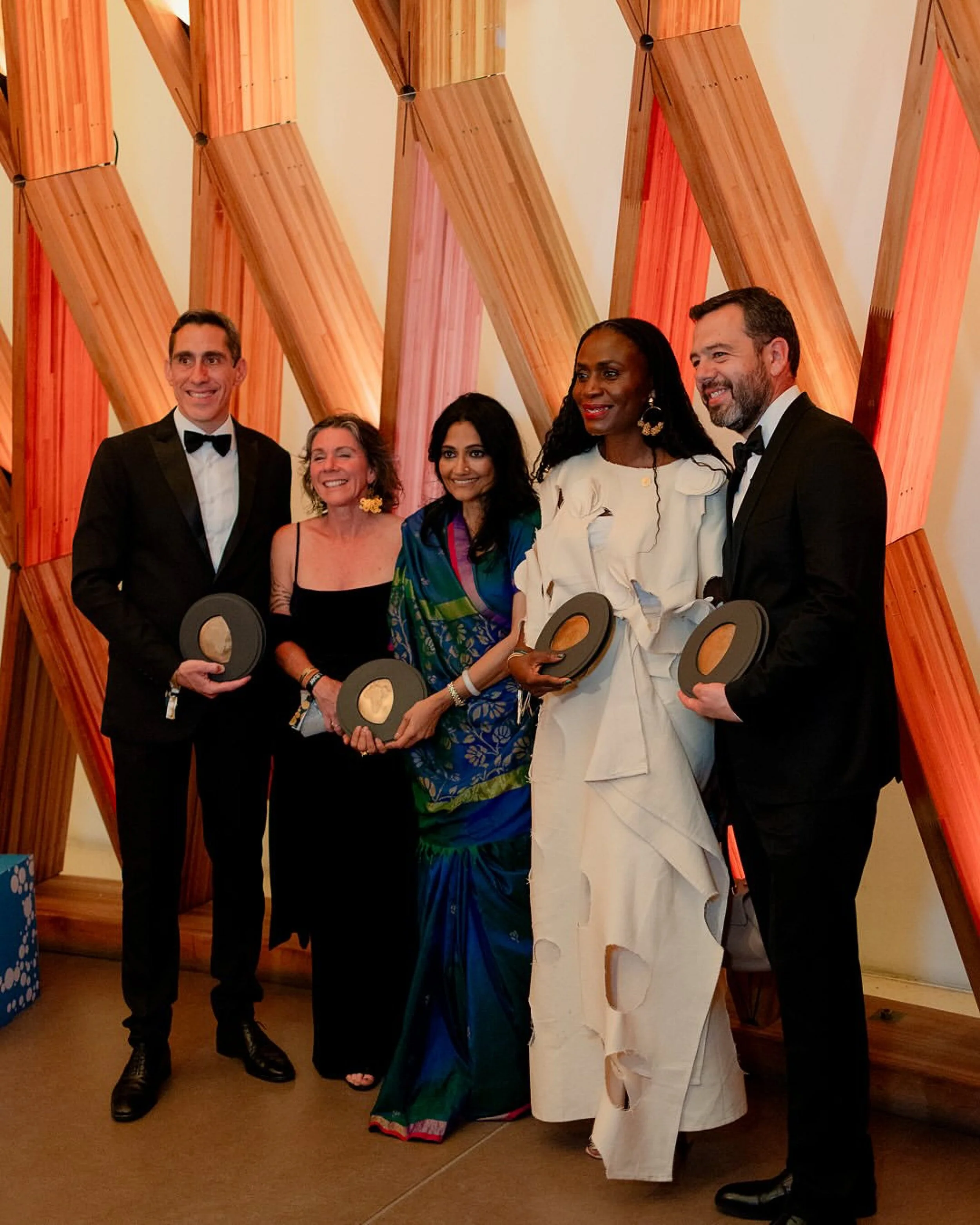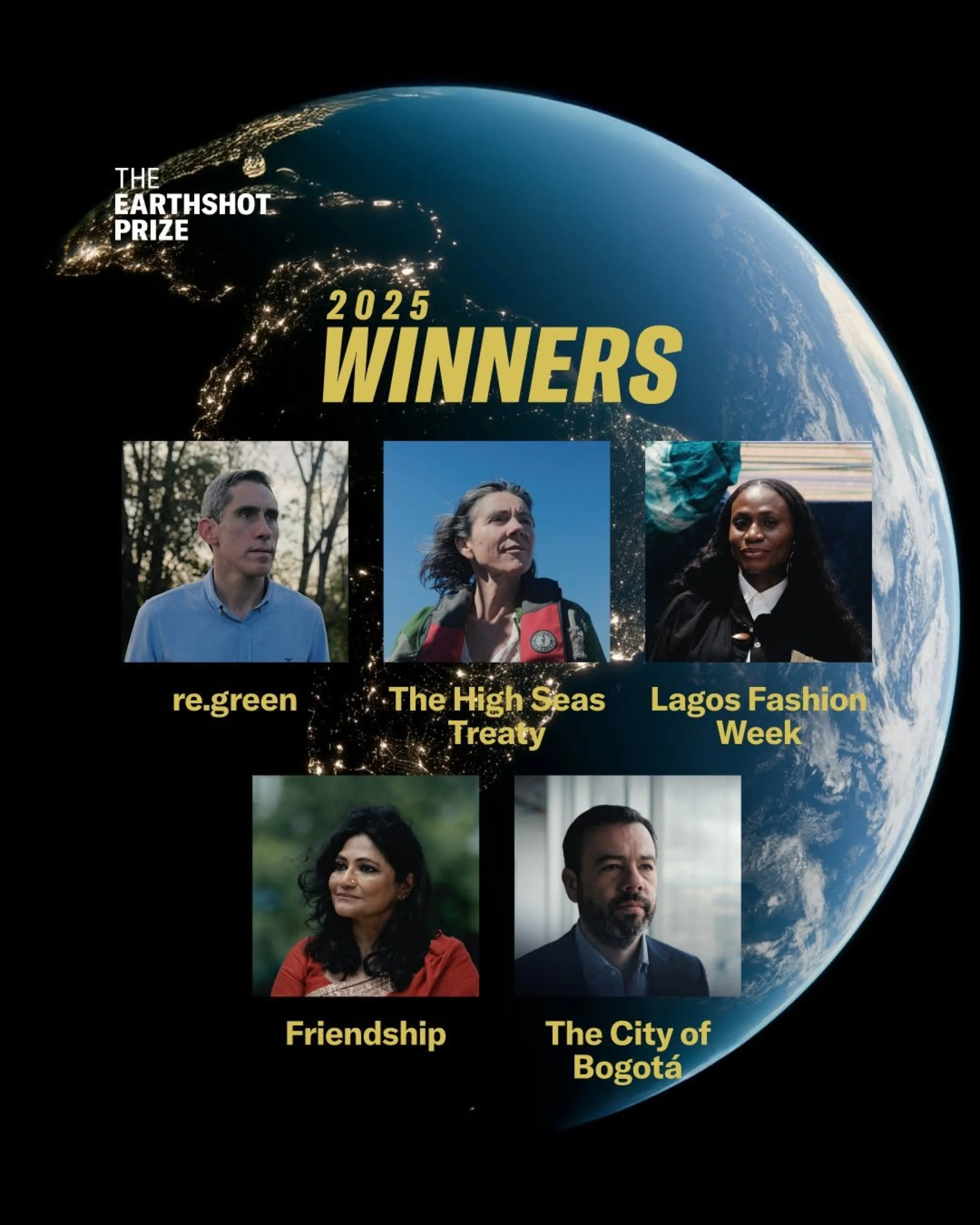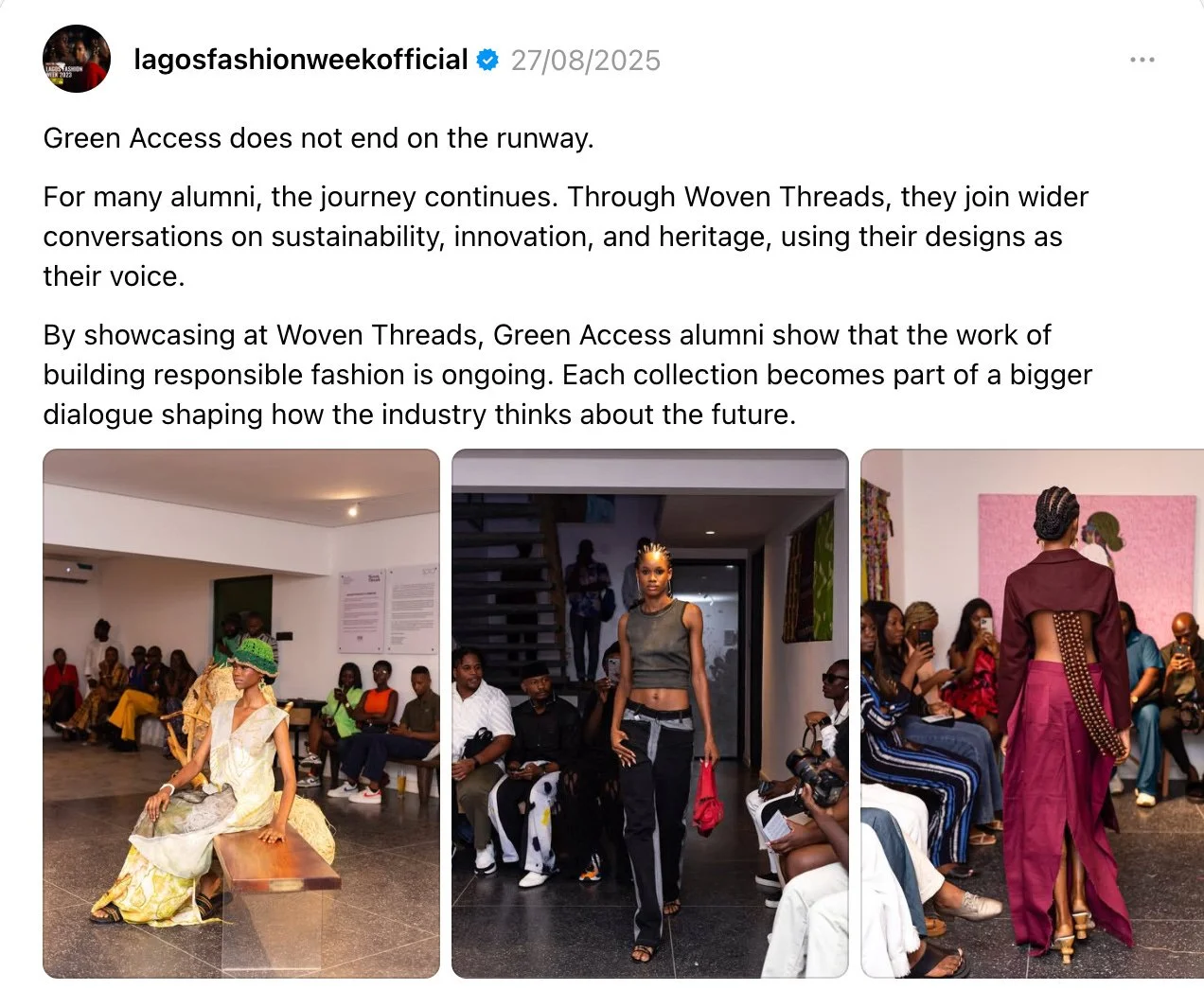Omoyemi Akerele in Dialogue with Tamara Cincik on Shaping Global Fashion Narratives
This Year's Earthshot Prize Winner on that incredible moment in Rio & her drive to make Lagos Fashion Week the most impactful global fashion week. Plus their shared vision for a regenerative future.
1) Omoyemi, firstly massive congratulations for winning the Earthshot Prize for Building a Waste-free World for your incredible work with Lagos Fashion Week. Can you say what the experience of the Earthshot Prize awards ceremony in Rio de Janeiro, Brazil was like?
Thank you so much!!! The Earthshot experience in Rio was amazing. Being in a room full of very inspiring innovators and community leaders who are all committed to building a world that works was energising. For me, it was less about the ceremony and more about what it represented, global recognition that the work happening in Lagos often quietly, often against the odds, is contributing meaningfully to real planetary value.
As I walked on stage to receive the award, I carried our community with me, designers, artisans, creatives who give of themselves daily, who show up with hope and determination. Standing on that stage felt like a moment of collective visibility for everyone who believes that fashion can be a tool for transformation. It was also a reminder of all that’s still missing within our ecosystem for it to thrive and therein lies the responsibility to steward this moment well as we grow our impact at Lagos Fashion Week.
Omoyemi Akerele, Accepting The Earthshot Prize 2025 in Rio de Janeiro for the “Build A Waste-Free World" Category, alongside other category winners.
2. For anyone who has not attended Lagos Fashion Week, what is the ethos behind it, and what led you to launch this fashion week in 2011?
Lagos Fashion Week emerged from a desire to build structure where there was talent but limited access. I have always believed that creativity thrives when supported by systems, knowledge, and community. The ethos is simple, viewed through the lens of collaboration, co creation and community, how do we platform talent, strengthen value chains, and create opportunities that outlive the runway moment. When we launched in 2011, it was about rewriting the narrative, that African fashion could be globally relevant, commercially viable, and rooted in culture without losing its essence From the start, our ethos has been about celebrating design, storytelling, and innovation, while creating opportunities for designers, artisans, and creatives to thrive. It’s about more than just fashion shows, it’s a platform that connects culture, commerce, and creativity, with a strong focus on sustainability and positive impact. Lagos Fashion Week is not just a fashion event, it’s an ecosystem building platform that discovers talents and provides opportunities.
3 At Fashion Roundtable, we increasingly work on the preservation of craft as a lever for culture, community and heritage. At Lagos Fashion Week how do you navigate preserving craft with boosting innovation?
At Lagos Fashion Week, we see craft and innovation as complementary rather than opposing forces. Preserving traditional techniques is essential to maintaining cultural heritage, but we also explore how these practices can evolve through new materials, sustainable processes, and creative experimentation. By providing a platform for both, we aim to honor Africa’s rich legacy of craftsmanship while inspiring designers to innovate in ways that are culturally grounded, sustainable, and relevant to today’s global fashion landscape.
Whether through Green Access, Woven Threads, or our workshops, we constantly ask, “How do we ensure that this heritage of craftsmanship that’s been passed down from generation to generation is not lost, and how do we prepare it for the future?” For us, the goal is skills preservation, honouring heritage while equipping artisans and designers with tools that make the work economically and environmentally friendly.
4 The consequence of fast fashion is the escalation in sales and overproduction, exploiting both the planet and people, and leading to an explosion in waste materials which cannot all be recycled. At Lagos Fashion Week how do you successfully navigate this issue?
At Lagos Fashion Week, we challenge the fast fashion model by championing circularity, sustainability, and responsible creativity. We focus on showcasing designers and practices that value quality, longevity, and innovation over mass production, while creating awareness about the environmental and social impact of fashion choices. By connecting culture, design, and sustainability, we aim to make responsible fashion not only possible but also desirable, proving that style and impact can go hand in hand.
5 We have showcased natural dyeing, as l was particularly moved when I read Alden Wicker’s book “To Dye For”, which exposes how toxic fashion is literally making us sick, and in many instances this starts with the dyes, which also in turn pollute our rivers. Is this an issue you have seen impacting Nigerian waterways? And if so, what impact has Lagos Fashion Week had in changing this?
Yes, it’s an issue. And it reinforces why this work matters. When rivers, communities, and the bodies of workers are affected, sustainability stops being theoretical. That is why we spotlight creatives who work with natural dyes and advocate for its use, we work with designers using safer techniques. We try to focus on showcasing natural dyeing and sustainable material practices to highlight safer, culturally grounded alternatives. Don’t forget that Nigeria is home to dye pits that date back to the 15th century.
By platforming designers and artisans who adopt these methods, we aim to influence both industry practices and consumer awareness, demonstrating that fashion can be beautiful, innovative, and safe for people and the planet.
But spotlighting brands or creating awareness is not enough, we now need to invest in training, expose designers to best practices, and support research. Our intention is to create pathways that make safer alternatives accessible, scalable, and aspirational. We are currently in talks with WaterAid and hope to share what’s next soon.
6) How challenging has it been to launch and lead a fashion week which has sustainability embedded in its DNA and what lessons have you learnt to help shift mindsets and businesses to shape brand behaviour?
Embedding sustainability from the start has been both challenging and rewarding. The biggest challenge has been shifting mindsets in an industry often driven by trends and fast production, and helping retailers, businesses, and consumers see that African designers approach to creativity, albeit slow, time consuming and sometimes more expensive, is aspirational and desirable.
The key lesson has been that change happens through collaboration, education, and visibility. By providing platforms, sharing knowledge, and celebrating sustainable creativity, we can inspire the wider industry to rethink practices and build a circular, responsible fashion ecosystem. Sustainability requires long term thinking in an industry that currently thrives and functions on immediacy. But at Style House Files / Lagos Fashion Week, we learn daily that for us to see the transformation that’s needed, we have to be consistent.
7) The workshops Lagos Fashion Week lead, sound fascinating, could you please expand on what these are and how they strengthen local craftmanship?
We have a variety of workshops and initiatives. They have been carefully curated to nurture sustainable design while strengthening local craftsmanship. Through Green Access, our sustainability accelerator, we mentor emerging designers from across Africa, helping them develop circular and eco-conscious practices that prioritize resource efficiency, longevity, and recyclability. Meanwhile, Woven Threads showcases artisanal heritage and material innovation, bringing together designers, communities, and thought leaders to celebrate craft, circularity, and sustainable futures. Together, these programs build skills, preserve traditional techniques, and inspire a new generation of designers to innovate responsibly while honoring Africa’s rich and shared heritage of craftsmanship.
8) If other fashion weeks adopted Lagos Fashion Week principles, what would that look like across the global fashion weeks calendar?
If other fashion weeks embraced the principles we champion at Lagos Fashion Week, the global fashion calendar would start to prioritize sustainability, circularity, and cultural impact alongside creativity. It would mean shows and events highlighting responsible production, material innovation, and the preservation of craft, while inspiring designers and audiences to value quality and longevity over mass production. Ultimately, it would shift the industry toward a model where fashion is not just beautiful, but also ethical, regenerative, and globally conscious.
9) Now you have won the Earthshot Prize, where do you see Lagos Fashion Week in the next 10 years?
Winning the Earthshot Prize has strengthened our ambition to show what fashion can achieve for people and the planet. In the next ten years, we see Lagos Fashion Week as a hub for a pan-African circular fashion ecosystem, where creativity, culture, and sustainability are deeply intertwined, and where designers, artisans, and consumers are connected through circular practices. We hope to inspire a continent wide and beyond movement that proves sustainable fashion can be desirable, aspirational, and central to Africa’s creative and economic future.
I see an ecosystem that’s more mature, one that’s self-sustaining, globally integrated, and locally empowering. I see stronger circular systems, fully developed craft clusters, and designers who are scaling without compromising values. I see Lagos and other African cities, Accra, Dakar, Johannesburg, Abidjan, Nairobi and more, recognized not just for style but for leadership, pioneering cities that demonstrate what’s possible when creativity meets purpose, collaboration, and infrastructure.
10. Thought leadership takes bravery and courage. What drives you, who inspires you and what keeps you going?
Purpose drives me. The belief that fashion, when well stewarded, can create jobs, preserve culture, dignify labour, and inspire new economic models. I am inspired by people, artisans who carry centuries of knowledge, designers who dare to imagine differently, young people whose resilience redefines possibility. I’m also driven by the belief that creativity and culture can be powerful tools for positive change. I’m inspired by African communities who are reimagining traditional craft and sustainability in bold, innovative ways. What also keeps me going is seeing how small ideas, when nurtured, shared, and celebrated, can grow into movements that shape industries, shift mindsets, and leave a lasting impact on people and the planet.
What keeps me going is a deep sense of conviction and responsibility powered by my faith in God, in a higher being beyond myself who has called me to do what I do, my family, my colleagues and the vision that propels us. It also helps to see the work itself, seeing transformation, even in small measures, and knowing that consistency over the years creates the kind of impact that can outlive trends.




